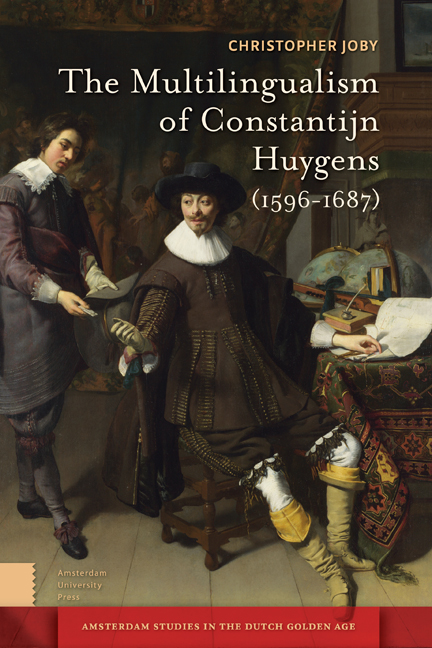Book contents
- Frontmatter
- Dedication
- Contents
- List of Illustrations
- List of Abbreviations
- Acknowledgements
- Prologue
- 1 Multilingualism: An Introduction
- 2 Huygens’s Language Acquisition
- 3 The ‘Multidimensionality’ of Huygens’s Multilingualism
- 4 Huygens’s Multilingualism in Music, Science, and Architecture
- 5 Huygens and Translation
- 6 Code Switching in Huygens’s work
- 7 The Multilingualism of Huygens’s Children
- Epilogue
- Appendix
- Bibliography
- Index
- Frontmatter
- Dedication
- Contents
- List of Illustrations
- List of Abbreviations
- Acknowledgements
- Prologue
- 1 Multilingualism: An Introduction
- 2 Huygens’s Language Acquisition
- 3 The ‘Multidimensionality’ of Huygens’s Multilingualism
- 4 Huygens’s Multilingualism in Music, Science, and Architecture
- 5 Huygens and Translation
- 6 Code Switching in Huygens’s work
- 7 The Multilingualism of Huygens’s Children
- Epilogue
- Appendix
- Bibliography
- Index
Summary
In their recent study of multilingualism Larissa Aronin and David Singleton write that ‘despite the fact that a single term is used to denote multilingual individuals and groups, we know that multilinguals differ in all kinds of ways’ (Aronin and Singleton: 118). Although their study is very much focussed on contemporary multilingualism, what they say holds true for historical individuals, such as Constantijn Huygens. In the present study, we have seen that some aspects of Huygens's multilingualism coincided with that of other individuals with whom he engaged. However, what has also become clear is that, taken as a whole, there is something very distinctive about his multilingualism. In this conclusion, consideration will be given on a language-by-language basis to what it is that makes his multilingualism so distinctive.
Eight languages formed the core of Huygens's multilingualism: Dutch, French, Latin, Greek, Italian, English, Spanish, and German. A significant factor in this choice of languages was that his education was aimed at preparing him for a life at court. To these eight core languages, we can add a limited knowledge of Hebrew and Portuguese, and several other languages with which he came into contact in a very limited manner, such as Arabic.
The extent to which Huygens knew and used each of the eight core languages varied significantly. One language that he used extensively was Dutch, but at times during his life he used other languages more than Dutch. Furthermore, he used different types of Dutch, or ‘Dutches’, in different situations. One approach to considering his use of language is to appropriate the language of distance and proximity (Koch and Österreicher 1985). He would often, though not always, use a more formal type of Dutch in his correspondence, the language of distance, and a Dutch closer to the spoken language, the language of proximity, in his poetry. Indeed, Huygens's poetry probably provides us with the best available picture of his spoken language, given the lack of oral sources.
Huygens had a keen ear for dialect. This is evinced by his use of the Haags Delflands subdialect of Hollands in a number of his poems, and his use of the Antwerps subdialect of Brabants, which he had picked up from his mother and her family, in the play Trijntje Cornelis.
- Type
- Chapter
- Information
- The Multilingualism of Constantijn Huygens (1596–1687) , pp. 309 - 316Publisher: Amsterdam University PressPrint publication year: 2014



